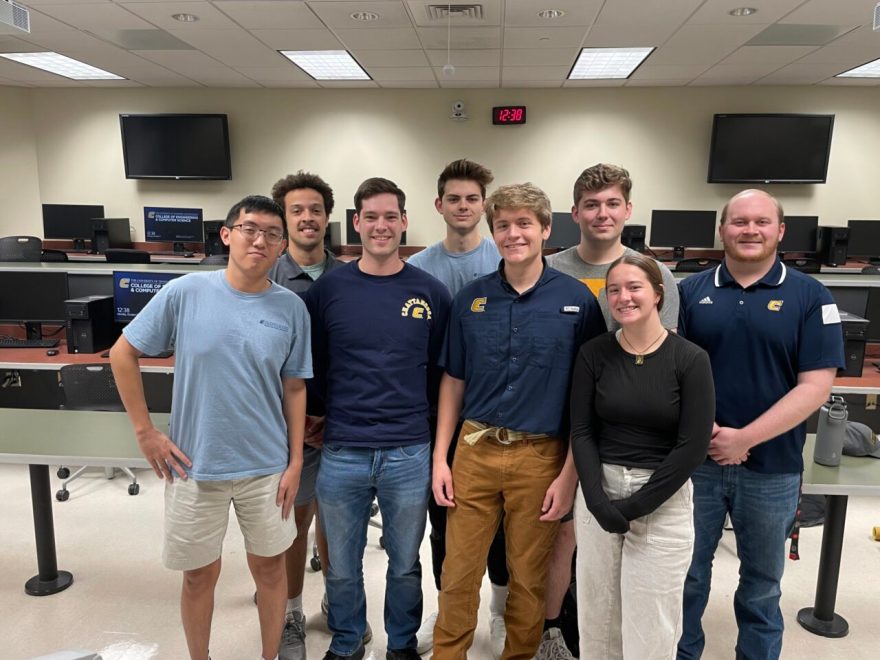
Rocket Mocs, from left: Joshua Tang, Isaiah Schmelzer, Sam Mossbeck, Jared Fiveash, Connor Mackey, Rett Stockman, Adrianne Glover and Canyon Blaylock.
The University of Tennessee at Chattanooga’s “Rocket Mocs” team has earned NASA recognition as one of the best in the country for a fifth consecutive year.
The team is again competing in the NASA Student Launch Challenge, a nine-month-long competition in which student teams from across the U.S. design, build, test and launch high-powered rockets carrying scientific or engineering payloads. The competition is a hands-on, research-based engineering activity and culminates each year with a final launch in Huntsville, Alabama, near the Marshall Space Flight Center.
The Rocket Mocs are one of 49 collegiate teams selected nationwide. The team was first accepted into the competition in 2019 and has been selected every year since.
The official launch for all current teams will be in April 2024.
Under the rules, the Rocket Mocs’ eight members—Rett Stockman, Canyon Blaylock, Sam Mossbeck, Connor Mackey, Isaiah Schmelzer, Joshua Tang, Jared Fiveash and Adrianne Glover—must build a rocket that can reach an altitude of at least 4,000 feet but no higher than 6,000 feet.
At 400 feet elevation on the rocket’s descent, it must release a payload without a parachute that falls to Earth and lands without damage. The type of payload is up to the teams. The Rocket Mocs decided theirs would be a drone of some kind; something that might be able to land itself.
How everything works together to achieve the goal is up to each team, but the final design must fit NASA rules, which are extensive.
“For me, the very initial feelings were being very overwhelmed with how involved this thing is and also not being familiar with how NASA does their rules,” Mossbeck said. “That rule document was like 100 pages. So each of us spent two or three days just reading through the entire thing.
“And the very first ideas that we started to have, we kept finding out they weren’t allowed, so that kept raising the stakes and feeling like we’re running out of ideas.”
Team leader Stockman said some rules are simple, “like don’t blow anything up.”
“But some of it gets really, really specific and it gets into launch procedures and stuff,” he said.
This year’s team members are all seniors majoring in mechanical engineering, but the Rocket Mocs are comprised of different students every year. Being selected for the NASA competition five years in a row is “a testament to how great our students are that we get accepted into this program each year,” said Dr. Trevor Elliott, UC Foundation associate professor in mechanical engineering and faculty advisor to the team.
“I am always impressed by the talent of our students,” he said. “We truly do get some of the best and brightest here at UTC.”
Adding to the pressure of this year’s competition, the team had only eight days to figure out how to meet NASA rules and submit a design proposal for approval. To make the deadline, each team member spent about 35 hours a week casting for ideas and researching possibilities for the competition, Stockman said. That was in addition to going to class and working on course assignments.
Each team member is now responsible for a specific rocket component, the payload or the competition.
“Every team member should have some sketches for different parts of the rocket,” said Stockman. “We’re going to go through and start deciding and ranking which we think is the best, and which one are we going to keep going forward with.
“Some of these ideas are a little out there. That’s the whole point.”
Now that they’re officially in the competition and have several months to figure out the complexities, the stress has reduced, Mossbeck said.
“I’m feeling a whole lot better,” he said. “I feel like I can trust my teammates to work on their stuff.”
Team members said they have been in one class or another with each other, which also lessens the worry.
“Pretty much everyone in here has been friends or worked together on something in the past,” Schmelzer said. “So seeing that everyone was someone we knew or someone we could count on was super beneficial.”
